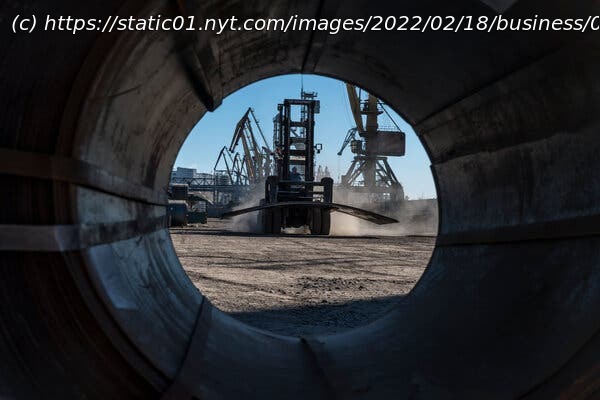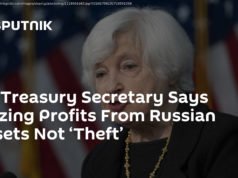A Russian invasion of Ukraine could push up oil and food prices globally at a time of already-high inflation. In the U.S., it will drive up uncertainty.
Russia’s threatened invasion of Ukraine could have economic repercussions globally and in the United States, ramping up uncertainty, roiling commodity markets and potentially pushing up inflation as gas and food prices rise around the world. Russia is a major producer of oil and natural gas, and the brewing geopolitical conflict has sent prices of both sharply higher in recent weeks. It is also the world’s largest wheat exporter, and is a major food supplier to Europe. The United States imports relatively little directly from Russia, but a commodities crunch caused by a conflict could have knock-on effects that at least temporarily drive up prices for raw materials and finished goods when much of the world, including the United States, is experiencing rapid inflation. Global unrest could also spook American consumers, prompting them to cut back on spending and other economic activity. If the slowdown were to become severe, it could make it harder for the Federal Reserve, which is planning to raise interest rates in March, to decide how quickly and how aggressively to increase borrowing costs. Central bankers noted in minutes from their most recent meeting that geopolitical risks “could cause increases in global energy prices or exacerbate global supply shortages,” but also that they were a risk to the outlook for growth. The magnitude of the potential economic fallout is unclear, because the scope and scale of the conflict remain anything but certain. But a foreign conflict could further delay a return to normalcy after two years in which the coronavirus pandemic has buffeted both the global and U.S. economies. Tension between Russia and Ukraine is escalating when American consumers are already contending with quickly rising prices, businesses are trying to navigate roiled supply chains and people report feeling pessimistic about their financial outlooks despite strong economic growth. “The level of economic uncertainty is going to rise, which is going to be negative for households and firms,” said Maurice Obstfeld, a senior fellow at the Peterson Institute for International Economics. He noted that the effect would be felt most acutely in Europe and to a lesser degree in the United States. A major and immediate economic implication of a showdown in Eastern Europe ties back to oil and gas. Russia produces 10 million barrels of oil a day, roughly 10 percent of global demand, and is Europe’s largest supplier of natural gas, which is used to fuel power plants and provide heat to homes and businesses.
Start
United States
USA — Financial Russia Is Sowing Conflict in Ukraine. What Does That Mean for the...






